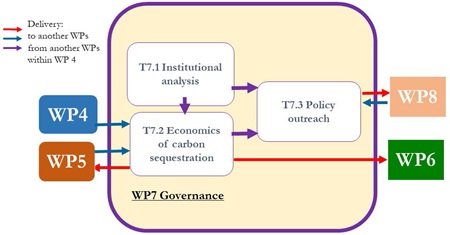Overview of tasks in work package 7
The tasks of this work package will provide governance recommendations for biodiversity, carbon and fisheries. We will carry out an institutional analysis that will examine gaps and synergies of biodiversity, carbon and fisheries policy in the MEESO study area of the northeast Atlantic based on a combination of desk based policy analyses and interviews of key stakeholders and governance actors (Task 7.1).
Drawing upon input from work packages 4-6 which deliver biophysical models of carbon, biodiversity and fish biomass in the study area, and economic analyses in work package 6, we will map sources and sinks for carbon sequestration, and assess tradeoffs of harvesting fish biomass against the value ecosystem services (i.e. social cost of carbon) (Task 7.2).
Based on these results we will deliver policy outreach materials (policy briefings) (Task 7.3).

Flows of information and data to, from and within work package 7. Click to see larger version
Task 7.1 Institutional analysis of fishing, biodiversity, and carbon policy relevant to mesopelagic resource development
Lead: World Maritime University
Using the Institutional Analysis and Development framework (Ostrom 2005; see bottom of page) we will assess the ‘policy landscape’ for mesopelagic resource utilization, conservation, and carbon management. The analysis will compare and contrast regulatory regimes and mandates, non-regulatory policy mandates, and agreements at the national and international levels, with the goal of identifying potential conflicts or synergies that might impede or catalyse the use of mesopelagic resources in the study region. The analysis will use a combination of desk-based policy analysis and semi-structured interviews with international experts (n~25) in ocean governance. The interviews will articulate the risks and opportunities arising from the use of mesopelagic resource under various governance trajectories (i.e., precautionary to innovation-oriented), the potential for new technologies to monitor and support compliance, and options to increase policy coherence and reduce regulatory uncertainty for resource users.
Task 7.2 Analysis of the economic value of carbon sequestration by mesopelagic species under different harvest scenarios and carbon values
Lead: World Maritime University
In task 7.2, we will conduct an analysis of the economic value (de Groot et al. 2002; see bottom of page) for mesopelagic carbon sequestration based on whether the zone is a source/sink under varying scenarios of future exploitation, climate change, and the social cost of carbon (i.e., costs imposed on society due to e.g. environmental, health, crop, or sea-level rise damages attributable to elevated atmospheric carbon emissions – Greenstone et al. 2013, Nordhaus 2017; see bottom of page). We will consider uncertainty arising from carbon source/sink dynamics and the social cost of carbon. The analysis will draw on harvest and processing costs (work package 3), resource mapping and modelling (work package 4 and work package 5), and economic analyses of fishery development (work package 6).
We assess the consequences of alternative governance approaches on carbon sequestration and evaluate its economic value relative to that of harvesting fish or conserving biodiversity. These will highlight potential carbon ‘hot spots’ in need of precautionary management and areas that are relatively robust to harvest pressure, from a carbon sequestration perspective.
The outputs from this task will be used to iteratively provide feedback to other work packages (e.g., advice on work package 5 scenario development, input on how considering carbon influences social acceptability in work package 6).
Task 7.3 Produce policy-oriented outreach and training materials for decision-makers in government, industry, and civil society
Lead: World Maritime University
Briefing notes about the implications of mesopelagic resources will be prepared addressing the carbon sequestration consequences under varying management and exploitation regimes. Herein we will also supply geographical maps identifying relevant policies for fisheries, biodiversity and carbon to be submitted as an ICES data resource.
References
de Groot, R.S., Wilson, M.A., Boumans, R.M.J., 2002. A typology for the classification, description and valuation of ecosystem functions, goods and services. Ecological Economics 41, 393-408.
Greenstone, M., Kopits, E., Wolverton, A., 2013. Developing a social cost of carbon for US Regulatory analysis: a methodology and interpretation. Review of Environmental Economics and Policy 7, 23-46.
Nordhaus, W.D., 2017. Revisiting the social cost of carbon. Proceedings of the National Academy of Sciences 114, 1518-1523.
Ostrom, E., 2005. Understanding Institutional Diversity. Princeton University Press.